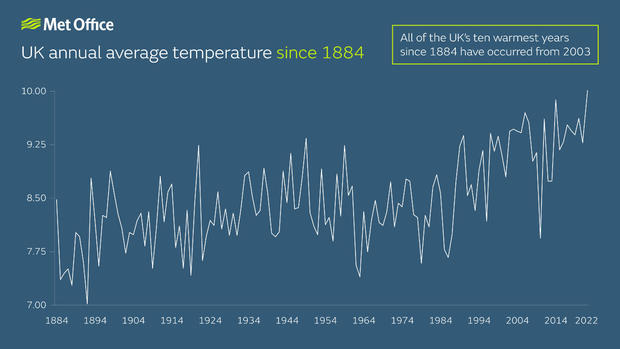2022 was officially the U.K.'s hottest year on record — and human-caused climate change made it 160 times more likely
Last year unleashed heat wave hell across the United Kingdom, with record-high temperatures scorching cities and drying up the source for London's iconic River Thames. On Thursday, the nation's meteorological office confirmed that it was officially the U.K.'s hottest year on record, a fate mostly fueled by human-caused climate change.
In a news release, the U.K.'s Met Office said 2022 saw an average provisional temperature of 10.03 degrees Celsius, or about 50 degrees Fahrenheit, which the office says is the highest since records began in 1884. The previous record of 9.88 occurred in 2014.
Every nation within the U.K. — England, Wales, Northern Ireland and Scotland — individually had record high average temperatures last year. England saw the biggest record jump, seeing an average 2022 temperature of 10.94 degrees Celsius, 0.19 degrees warmer than its previous heat record in 2014.
The region has been experiencing above-average heat for years, seeing average temperatures of 9.4 degrees Celsius in 2019, 9.6 degrees Celsius in 2020 and 9.3 degrees Celsius in 2021. Last year's temperatures were 0.89 degrees Celsius higher than the 1991-2020 average.
Mark McCarthy, head of the Met Office National Climate Information Centre, said the news is a "notable moment in our climatological history."
"This moment comes as no surprise, since 1884 all the ten years recording the highest annual temperature have occurred from 2003," he said.
And humans are largely to blame for the rising extremes. The Met Office said human-caused climate change made the 2022 record about 160 times more likely.
Nikos Christidis, the office's climate attribution scientist, said researchers used climate models comparing the likelihood of the record under both the current climate and a world without "historical human climate influences."
"The results showed that recording 10°C in a natural climate would occur around once every 500 years, whereas in our current climate it could be as frequently as once every three to four years," Christidis said.
The news follows a brutal year of baking under the sun.
Throughout June and July, a heat wave scorched the region, as well as other parts of Europe, Asia and the U.S. In July, Britain surpassed 40 degrees Celsius — 104 degrees Fahrenheit — for the first time in its history. It was so hot that for the first time since 1976, the water source for the River Thames in London dried up.
Copernicus, Europe's climate observation service, confirmed in September that it was officially the hottest summer ever recorded in Europe, just weeks after European officials said the continent was experiencing its worst drought in 500 years, with those conditions impacting nearly two-thirds of its nations.
And based on the Met Office's research, this record-breaking heat could become the norm in the U.K. if measures aren't taken to reduce emissions of carbon dioxide — a greenhouse gas that accounts for the greatest amount of human-caused global warming, according to the EPA. Human activities, namely the burning of fossil fuels, resulted in record levels of CO2 emissions in 2022.
Christidis said that under a medium emissions scenario in which emissions levels stay about the same until roughly 2050 and don't decline until around or after 2100, "a UK average temperature of 10°C could occur almost every year." It's important to note, however, that some years could see a dip in temperatures while long-term trends will clearly display the warming trend.





